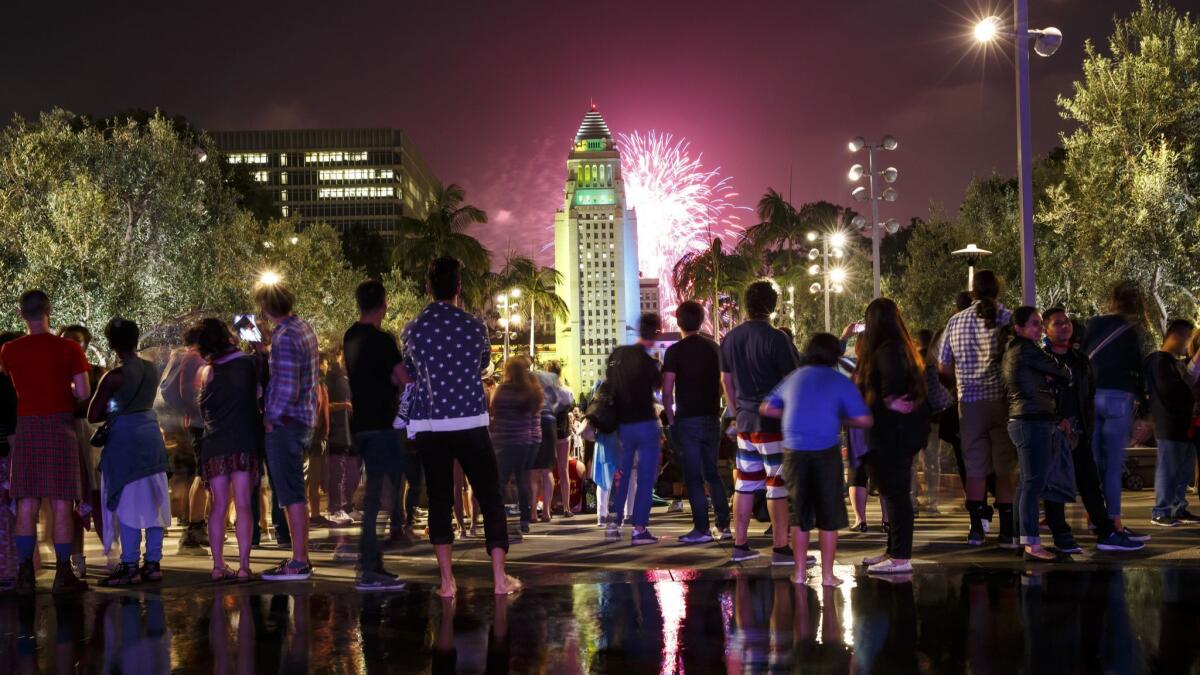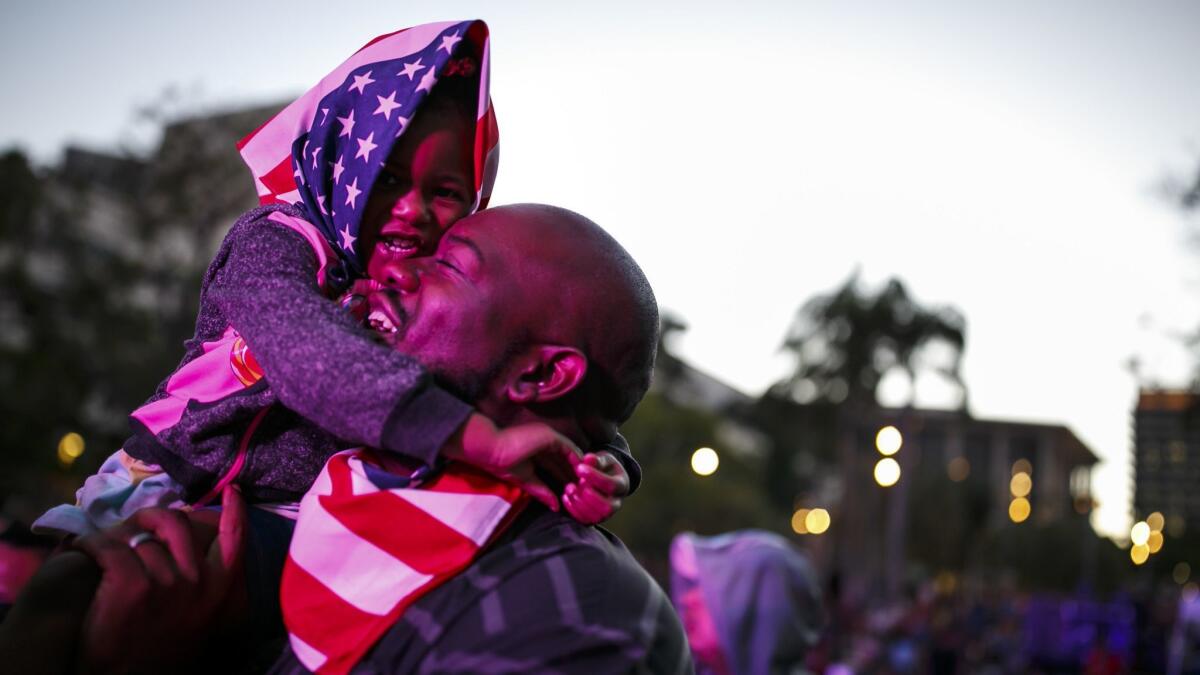An appreciation of the pyrotechnic anarchy of 4th of July in Los Angeles

- Share via
Every summer in Los Angeles, the police department, fire agencies and politicians take great pains to warn the public about the dangers of illegal fireworks.
Safety experts present at schools, where they show children slides of full-body burn victims and tell stories of firework noise scaring pet dogs into running away from their owners, never to be reunited again.
Authorities distribute nearly 20,000 fliers in English and Spanish, and offer a bright orange PDF for download to use as an anti-fireworks lawn sign. The LAPD records reports of fireworks by location, using a specialized system that generates data that authorities analyze to determine hot spots. Preemptive warning letters are sent to houses suspected of hosting perennial illegal fireworks shows.
Then, every July Fourth, a lot of us ignore those warnings, with spectacular results. There has never been a fireworks show that can compare to getting up on any building in Los Angeles and turning in a circle. It is 360 degrees of joyful, pyrotechnic anarchy.
The holiday, or at least the firework noise, actually lasts about two months. It starts around Memorial Day with a series of furtive, infrequent crackles and pops. It’s far enough from the holiday that people — especially those new to the city or posting on Nextdoor — always seem to mistake them for gunshots (hint: It’s almost always fireworks). The pace grows until a week or so before the holiday; explosions can come at any hour of day or night.
On the fourth itself, the city becomes a beautiful war zone. Haze hangs heavy in the air as booms and cracks fill your ears like distant thunder. If you’re driving on an elevated freeway, you can look left or right and see fireworks bloom at eye level.
It’s easily my favorite holiday to experience in Los Angeles. The most patriotic I ever feel is when I look out across the city on Independence Day. The fireworks look cool, but I also think about what’s beneath them: so many people from so many places, celebrating the fact that they are here, in America, in Los Angeles.
I can’t help but be moved. When my mom had the opportunity to pick her own birthday upon immigrating to America in the ’80s, she picked July 4.
I see our fireworks as a powerful, defiant reminder that Los Angeles is a city of immigrants, and that no matter who our president is, immigrants are American and this holiday belongs to them, too.
COLUMN: The No. 2 Metro bus connects the fantasies and realities of Los Angeles »
This, I have to stress, is my own perspective as someone who is a heavy sleeper; who does not own a dog or suffer from post-traumatic stress disorder or any of the many conditions worsened by constant, unpredictable noise.
Fireworks are illegal in Los Angeles and restricted throughout California for good reason. Mishandled or poorly made illegal fireworks cause horrific injuries and kill an average of seven people every year, according to the Consumer Product Safety Commission.
Stray fireworks launches also can cause wildfires that kill people, wipe entire towns off the map and inflict millions in property damage. And the night after the Fourth of July, city animal shelters swell with lost pets, and many will never find their owners again.
“It may be traditional for some, but it’s also illegal, dangerous, and frankly, just not OK,” said David Barrett, director of MySafe:LA, a nonprofit that works with the city on fireworks safety and other issues. “Fireworks are part of our American fabric, but that doesn’t translate into flagrant avoidance of law, courtesy, and public safety.”
Barrett and public safety officials encourage people to attend one of the many legal fireworks shows around the county. And for one week a year, around July Fourth, you can buy legal fireworks from vendors like TNT Firework, which partners with nonprofits and runs about 757 temporary stands across Southern California. These “safe and sane” fireworks, as they’re called, don’t leave the ground, explode or shoot sparks very high. They are indeed much safer, and TNT Firework vice president John Kelly tells me they’ll sell about 100 truckloads this week.
But you just have look up in the sky on the Fourth to see which kind is more popular.
I haven’t always loved L.A.’s fireworks either. My first few years here I also found the explosions stressful, then repetitive and irritating. But a few years ago, I was driving home from a celebration in MacArthur Park, and found myself hemmed in by illegal fireworks exploding behind and in front of my car.
At first I was irritated. I had seen enough fireworks from the roof of my friend’s apartment, and I could hear fireworks fragments denting my car.
But then the smoke cleared, and my headlights illuminated a boy who looked to be about 11 years old, a Bic barbecue lighter in his tiny hand. He looked at me with the most radiant smile and I had to admit that my car was old and crappy anyway and all the chaos was pretty fun.
Since then, I’ve always found myself around impromptu fireworks shows on the Fourth of July. I’ve found that the spontaneity of an illegal July Fourth fireworks show really brings people together. People come out of their houses when the sparks start flying and we all exchange the same scandalized-but-excited grins.

Jeff, 30, who lives in central Los Angeles, said that the fireworks shows make his mostly black and Latino neighborhood feel like a real community. Neighbors don’t interact much with each other until the fourth, when they all get together and put on what amounts to a block party with a fireworks show, barbecue and even fire-spinning performances.
He says the Fourth of July — consciously or not — means a lot to people with immigrant backgrounds.
“We know where we could be instead, and what our families could have been going through instead,” said Jeff, whose parents are Chinese immigrants from Vietnam. “We wake up on July 4, and we’re like, ‘Wow, we can do this here, even if it’s illegal.’ It’s a really beautiful thing.”
I see our fireworks as a powerful, defiant reminder that Los Angeles is a city of immigrants.
— Frank Shyong
Levi, 31, lives in Pacoima, which lies in the middle of a region that generates the most fireworks-related LAPD calls for service in the city.
He understands that illegal fireworks are dangerous and gets why officials are cracking down. But fireworks are in his blood. His dad, born in El Salvador, grew up making them as well as firing them off, and he taught Levi how to operate them at a young age.
They don’t go to professional fireworks shows because the holiday is about being with family. They try to be safe — his mom is always telling him he’ll lose a finger — but the danger, noise and chaos is all part of the fun, Levi said.
In Mexico, fireworks are produced largely by a cottage industry of families making them by hand. Children grow up making them and firing them off to celebrate festivals that honor patron saints.
There’s even a patron saint of fireworks makers, San Juan de Dios, who was canonized for saving patients from a burning hospital. (San Juan de Dios, ironically, is also the patron saint of firefighters and hospitals.)
COLUMN: On Virgil Avenue, avocado toast and four different versions of the same city »
In the fireworks capital of Tultepec, Mexico, the festival celebrating San Juan de Dios involves a parade where participants dash around wood-frame bulls rigged with thousands of igniting fireworks. A 2016 explosion in the fireworks market killed at least 32 people — but the next year, the festivities continued unabated.
The many wounds caused by the festivity are treasured as scars that are said to show the place where San Juan de Dios lifted the victim from the fire.
“We want the noise. The obnoxiousness of it, the silliness of it, the joyfulness of it. It’s all part of it,” said Levi, a new father who is planning to put on a fireworks show for his kids this year.
So when you look up in the sky this Fourth of July, remember that fireworks are illegal in the city of L.A., and dangerous.
But also remember beneath those illegal fireworks, parents are passing down important cultural traditions to their kids and creating new ones. Neighbors who would never otherwise interact are talking, even if it’s just to complain about the noise. Low-income families are giving their kids unforgettable memories.
I can’t think of anything more American than that.
More to Read
Sign up for Essential California
The most important California stories and recommendations in your inbox every morning.
You may occasionally receive promotional content from the Los Angeles Times.






![Vista, California-Apri 2, 2025-Hours after undergoing dental surgery a 9-year-old girl was found unresponsive in her home, officials are investigating what caused her death. On March 18, Silvanna Moreno was placed under anesthesia for a dental surgery at Dreamtime Dentistry, a dental facility that "strive[s] to be the premier office for sedation dentistry in Vitsa, CA. (Google Maps)](https://ca-times.brightspotcdn.com/dims4/default/07a58b2/2147483647/strip/true/crop/2016x1344+29+0/resize/840x560!/quality/75/?url=https%3A%2F%2Fcalifornia-times-brightspot.s3.amazonaws.com%2F78%2Ffd%2F9bbf9b62489fa209f9c67df2e472%2Fla-me-dreamtime-dentist-01.jpg)







